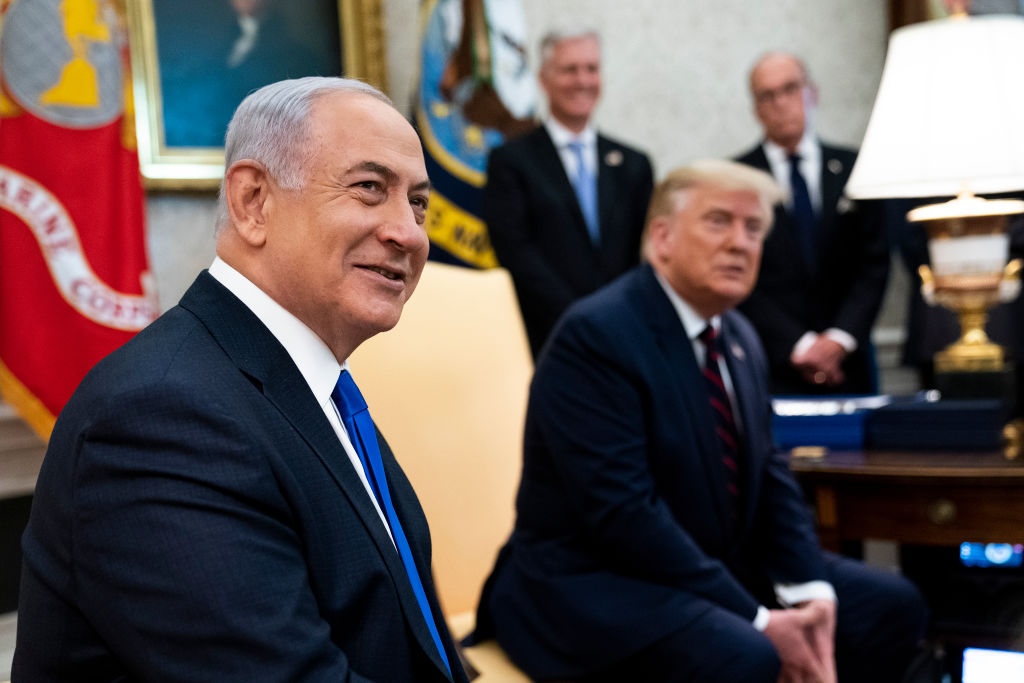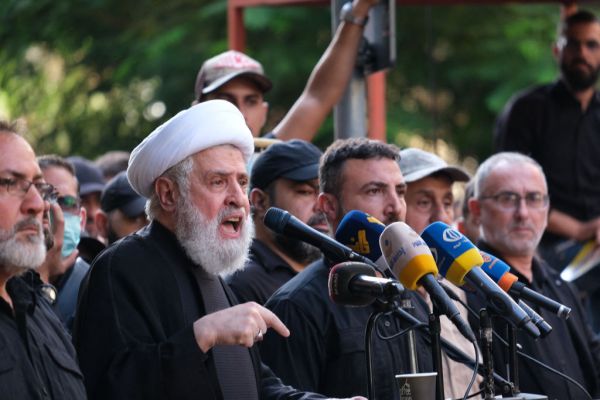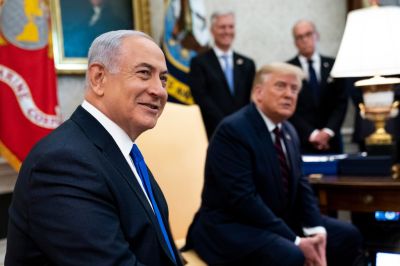On the same day that Benjamin Netanyahu fired Yoav Gallant, Israel’s wartime defense minister and an emerging political rival, the prime minister scored what he undoubtedly views as another win: Donald Trump’s victory in the U.S. election. In the week since, the Israeli leader’s luck has gone from good to better with the president-elect’s decision to name a series of Iran hawks and Israel supporters to fill key posts in his administration.
Going forward, both Netanyahu’s shakeup and a new Trump administration stand to reshape the direction of Israel’s war against Iran and its proxies across the Middle East.
If personnel is policy, then Israeli officials have reason to hope for a tougher U.S. approach to Tehran come January. Trump has reportedly appointed Brian Hook, who helped shape the Iran policy of the president-elect’s first term, to head the State Department’s transition team. Hook—who, like Trump and Netanyahu, has been targeted for assassination by the Iranian regime—is likely to pursue a hard-line policy toward Iran.
Another member of Trump’s coalescing diplomatic team, GOP Rep. Elise Stefanik of New York—the pick for U.S. ambassador to the United Nations—has been a leading critic of what she describes as the Biden administration’s anemic approach to Tehran. “For too long, our enemies have been emboldened by the weakness of the Biden-Harris Administration,” she tweeted Saturday, announcing plans to resume the Trump-era maximum pressure sanctions regime on Iran.
Assaf Orion“Like so many in the world, the Iranians need to do their math on how they want to enter a Trump tenure.”
On Tuesday, the former president formally named Republican Rep. Michael Waltz of Florida, a Green Beret veteran who’s pushed for greater U.S. pressure on Iran and its proxies, as his national security adviser. Trump’s pick for the coveted secretary of state post, Sen. Marco Rubio of Florida, has criticized Iran as a “terrorist regime” and drawn attention to its sponsorship of regional terrorism. “Without Iran, there is no Hamas. Without Iran, there is no Hezbollah,” he said in an interview this month.
Trump announced Tuesday his intent to nominate former Arkansas Gov. Mike Huckabee, an evangelical Christian, to serve as the U.S. ambassador to Israel. “He loves Israel, and the people of Israel, and likewise, the people of Israel love him,” the president-elect said in a statement.
“Generally speaking, Israeli officials are tremendously content—on the verge of euphoria—over this Cabinet and the Trump nominations. This is better than they expected, and they feel this is in line with the American-Israeli alliance,” Israeli political commentator Nadav Eyal told The Dispatch. “Of course, people who dislike the Netanyahu government—and that’s at least half of the public—are not too overjoyed by the knowledge that the Trump administration is going to give Netanyahu backing and that some of these nominations are actually personal pals or people who have voiced support for Netanyahu before.”
At the same time that the Israeli prime minister’s support in Washington appears to be shoring up, he is attempting to eliminate opposition from within the ranks of his own government with the firing of Gallant. Netanyahu first tried to oust his fellow Likud party member in March 2023, after Gallant warned that domestic divisions over the government’s controversial effort to reform Israel’s judicial system posed “a clear, immediate, and tangible threat to the security of the state.”
The prime minister reversed his decision to dismiss Gallant following a wave of mass protests that spring, but no such public opposition could spare his job this time around. As Americans cast their ballots last Tuesday, Netanyahu gave Gallant a letter of dismissal that went into effect 48 hours later. The move provoked swift and severe backlash from Israelis, many of whom accused the prime minister of prioritizing his own political fate over the country’s national interest amid a multifront war.
Many analysts see the decision as an ongoing debate in Israel over military service exemptions for ultra-Orthodox Jews coming to a head. Netanyahu’s governing coalition relies on support from two ultra-Orthodox parties, which have pushed for laws enshrining the Haredi community’s ability to avoid the mandatory conscription to which most Jewish Israelis and Druze Israeli men are subject. Gallant, on the other hand, reiterated the national security imperative of a “large-scale” draft of Haredim just one day before his firing.
With the defense minister out of the way, Netanyahu may be able to strengthen his coalition by pushing through unpopular legal protections for the exemptions. But the prime minister has long had a fraught relationship with the Israeli defense establishment. Gallant is the fourth defense chief to be fired or resign after public rifts with Netanyahu. Hamas’ October 7, 2023, assault on Israel only exacerbated those divides, as the prime minister pointed the finger at the Israeli military for the security and intelligence lapse that allowed the attack to unfold.
Gallant’s departure can also be understood as an effort by Netanyahu to “consolidate control” over the future of the war, said David Daoud, a senior fellow at the Foundation for Defense of Democracies. Gallant’s replacement, former Foreign Minister Israel Katz, is a close Netanyahu ally with little military background of his own.
But don’t expect a Bibi-controlled defense ministry to pursue more aggressive war aims, particularly when it comes to Israel’s northern front. Katz on Sunday declared Hezbollah “defeated” as Jerusalem pursues an agreement to wind down the war in Lebanon. Gallant, in contrast, was a Hezbollah hawk from the war’s start, advocating for a sweeping preemptive Israeli attack as early as October 2023.
When it comes to the war against Hamas in Gaza, Gallant—like the Biden administration—had pushed the Israeli government to accept a ceasefire deal to secure the release of the terror group’s hostages. This dynamic may have contributed to Netanyahu’s perception of the defense minister as an American surrogate, as Israeli journalist Amit Segal explained in the Call Me Back podcast. “In Bibi’s eyes, he is the underdog,” he told host Dan Senor, “the one who is dealing with a hostile U.S. administration, with Gallant, who he sees as the U.S. ambassador to Tel Aviv—a politician that serves American interests.”
Netanyahu likely hopes Trump’s victory will afford him a less adversarial relationship with the White House. The leaders have spoken on the phone three times recently, the Israeli prime minister said Sunday, and the two see “eye to eye on the Iranian threat in all its components.”
And indeed, Trump’s first stint in the White House was marked by a punishing approach to Iran. In addition to pulling out of the Obama-era nuclear deal and implementing damaging sanctions against Iran and its proxies, the former president ordered the killing of Quds Force commander Qassem Suleimani. He also oversaw a series of pro-Israel maneuvers, including moving the U.S. Embassy in Israel to its capital Jerusalem, recognizing Israeli sovereignty over the Golan Heights, and brokering a series of diplomatic normalization treaties known as the Abraham Accords.
But if the Israeli right expects free rein to continue fighting Hezbollah and Hamas under a Trump presidency, it’s in “serious danger of being disappointed,” Chuck Freilich, Israel’s former deputy national security adviser, told The Dispatch. “Even in the transition [Trump will] apply pressure to end the wars in Gaza and Lebanon, because he doesn’t want to inherit the problem.”
Trump has publicly and privately called on Israel to wrap up its war effort, including by telling Netanyahu to “finish up and get it done quickly.” On the campaign trail, the former president appeared alongside leaders of Michigan’s Muslim community, who described him as a leader who “promises peace, not war.” On Friday, Trump spoke to Palestinian Authority (PA) President Mahmoud Abbas for the first time since the U.S. recognized Jerusalem as the capital of Israel in 2017. Trump emphasized his commitment to ending the war in Gaza during the conversation, according to a PA read-out.
On Iran, too, there may be cause for concern for Israel. Vice President-elect J.D. Vance recently reiterated his support for Israel’s right to defend itself but distanced the U.S. from a theoretical military operation. “Sometimes we’re going to have overlapping interests, and sometimes we’re going to have distinct interests,” he said last month. “And our interest very much is in not going to war with Iran.”
Such equivocations are particularly troublesome in light of Iran’s advances toward a nuclear weapon—a threat that may be difficult if not impossible for Israel to counter militarily without U.S. support. “On the one hand, getting a green light is nice. But this is a green light that Israel doesn’t really want,” Freilich said. “It doesn’t want to be on its own.”
Assaf Orion, a retired Israeli brigadier general who is now a senior fellow at the Washington Institute for Near East Policy, agreed: “Trump has said, ‘I won’t be starting wars, I’ll be ending them.’ What does that mean for issues that require force employment? When push comes to shove, what about Iran’s nuclear program? Is there an expectation that Israel will do what it needs to before January 20?”
As Israel calculates its next move in light of new U.S. leadership, Iran is doing the same. While some analysts worry the regime might pursue a nuclear weapon during the transition period, others think Tehran may be cowed into de-escalating its war against Israel by the prospect of an incoming Trump administration.
“Iran is in a panic,” Eyal Pinko, an expert on Iran and a former senior official in Israel’s intelligence services, told The Dispatch. “Not only because of Trump’s election, but also because of the people that Trump has appointed.”
These early personnel choices will likely factor into Iran’s decision-making as it considers whether to use the transition to escalate its conflict with Israel or step down from the brink.
“Iran is staring into a Trump period,” Orion told The Dispatch. “Like so many in the world, the Iranians need to do their math on how they want to enter a Trump tenure.”







Please note that we at The Dispatch hold ourselves, our work, and our commenters to a higher standard than other places on the internet. We welcome comments that foster genuine debate or discussion—including comments critical of us or our work—but responses that include ad hominem attacks on fellow Dispatch members or are intended to stoke fear and anger may be moderated.
With your membership, you only have the ability to comment on The Morning Dispatch articles. Consider upgrading to join the conversation everywhere.